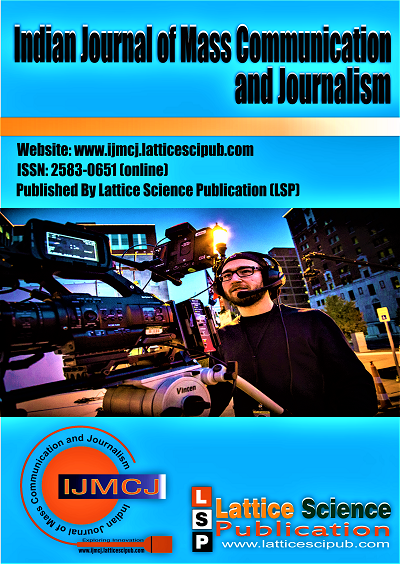The Stakeholders’ Views on the Media Authority Act 2013 on Freedom of Expression in South Sudan
Main Article Content
Abstract
This study critically explores stakeholders’ perceptions of the Media Authority Act 2013 and its influence on the state of freedom of expression in South Sudan. Despite constitutional and legal provisions that ostensibly protect media rights, concerns persist regarding the actual realisation of these freedoms in practice. The research was conducted to investigate the impact of the Media Authority Act on journalistic practices, regulatory autonomy, and public discourse, with a particular focus on how legal frameworks either promote or hinder freedom of expression. This study addresses a pressing issue in South Sudan’s democratic development, where media freedom is often caught between state control and civil society’s demand for openness and accountability. A mixed-methods approach was employed, incorporating qualitative data from 25 semi-structured interviews with journalists, civil society actors, media regulators, and government representatives, as well as quantitative data from surveys administered to 80 media practitioners across Juba, Wau, and Malakal. The analysis was guided by theories of media regulation and freedom of expression, particularly drawing from liberal democratic and critical legal theory. Findings reveal that while the Media Authority Act 2013 is framed as a regulatory mechanism to ensure professionalism and accountability in media operations, its implementation is often marred by political interference, vague legislative language, and inconsistent enforcement. Stakeholders reported a general lack of institutional independence, widespread fear of censorship, and restrictions on critical reporting, particularly on political and security issues. These challenges have led to self-censorship among journalists, limiting the media’s ability to serve as a watchdog of government activity. This study concludes that although the Media Authority Act has the potential to support a more structured media environment, its current application undermines the very freedoms it purports to safeguard. Reforming the Act to align with international human rights standards, coupled with building the institutional capacity and independence of regulatory bodies, is essential for fostering a free, pluralistic, and democratic media space in South Sudan. The research contributes to ongoing discussions on media freedom in post-conflict states and provides practical policy recommendations for promoting freedom of expression within fragile governance contexts.
Downloads
Article Details

This work is licensed under a Creative Commons Attribution-NonCommercial-NoDerivatives 4.0 International License.
How to Cite
References
African Charter on Human and Peoples' Rights (ACHPR) (1981). Organization of African Unity. Available at: https://www.achpr.org/
Best, J. W., & Kahn, J. V. (2007). Research in Education. New Delhi: Prentice Hall of India. https://www.scirp.org/reference/referencespapers?referenceid=2017207
Bhaskar Gogoi (2019). Understanding the Human Rights Status in South Sudan. Gauhati University. (Unpublished; https://thinkindiaquarterly.org/index.php/think-india/article/view/9685/5432
Bayat, A. (2002). Activism and social development in the Middle East. International Journal of Middle East Studies, 34(1), 1–28.
DOI: https://doi.org/10.1017/S0020743802001013
Chandler, D., & Munday, R. (2011). Media Law. In A Dictionary of Media and Communication. Oxford University Press. https://doi.org/10.1093/acref/9780199568758.001.0001
Mouffe, C. (2016). The ontological primacy of the political. In Arata D. Yamamoto, Planning Theory, 16(4), 384–403.
DOI: https://doi.org/10.1177/1473095216672842
CIPESA (2022). The State of Media Freedom and Journalists’ Safety in Africa 2022. Available at: https://cipesa.org/?wpfb_dl=506
Cooper, D. R., & Schindler, P. S. (2003). Business Research Methods (8th ed.). Tata McGraw-Hill Publishers. https://www.scirp.org/reference/referencespapers?referenceid=1121935
Creswell, J. W. (2014). Research Design: Qualitative, Quantitative, and Mixed Methods Approaches (4th ed.). Sage Publications. https://www.ucg.ac.me/skladiste/blog_609332/objava_105202/fajlovi/Creswell.pdf
D’Agoot, M. (2018). Taming the Dominant Gun Class in South Sudan. Special Report No. 4. Africa Centre for Strategic Studies. https://africacenter.org/publication/taming-the-dominant-gun-class-in-south-sudan/
Heyns, C. (2004). The African Regional Human Rights System: The African Charter. Pennsylvania State Law Review, 108, 679. https://www.pennstatelawreview.org/articles/the-african-regional-human-rights-system/
Ibua, P. M. (2014). The Influence of Institutional Factors and Job-Related Attitudes on the Relationship Between Employee Empowerment and Performance of Public Universities in Kenya (Unpublished PhD Thesis). University of Nairobi. https://erepository.uonbi.ac.ke/handle/11295/76397
United Nations Committee on Economic, Social and Cultural Rights (2018). Report on the 63rd and 64th sessions. Available at: https://www.ohchr.org/en/documents/reports/economic-social-and-cultural-rights-annual-report-2018
Idowu, S., Cheney, G., & Roper, J. (Eds.). (2018). ISO 26000: A Standardized View on Corporate Social Responsibility. Springer.
DOI: https://doi.org/10.1007/978-3-319-72616-0
Kachingwe, P. (2016). Agenda-setting in authoritarian media regimes: A study on media control and freedom in South Sudan. Journal of Media and Politics, 18(4), 45–63. DOI: https://doi.org/10.1386/macp.18.4.45_1
Kalpakian, J. (2017). Peace agreements in a near-permanent civil war: Learning from Sudan and South Sudan. South African Journal of International Affairs, 24(1), 1–19. DOI: https://doi.org/10.1080/10220461.2017.1288427
UNMISS (2018). Convention Against Torture and Other Cruel, Inhuman or Degrading Treatment or Punishment. Available at: https://www.ohchr.org/en/treaty-bodies/cat
Wangui, I. (2016). The African Editors Forum Declaration on World Press Freedom Day. African Media Initiative. Available at: https://africanmediainitiative.org/
McCombs, M. E., & Shaw, D. L. (1972). The agenda-setting function of mass media. Public Opinion Quarterly, 36(2), 176–187.
DOI: https://doi.org/10.1086/267990
Fredrick, J. (2015). Social responsibility theory and media freedom: An assessment of media accountability in developing democracies. Journal of Media and Communication Studies, 7(3), 45–52. DOI: https://doi.org/10.5897/JMCS2015.0402
BBC News (2012). South Sudan profile. BBC News, 22 February 2012. Available at: https://www.bbc.com/news/world-africa-14069082
ABC News (2015, August 30). South Sudan’s President Salva Kiir Signs Peace Deal. Available at: https://www.usip.org/publications/2015/08/south-sudan-peace-process-key-facts
Amnesty International (2018, September 09). South Sudan: Arbitrary Arrests, Torture of Detainees Despite Repeated Promises. Available at: https://www.amnesty.org/en/latest/news/2018/09/south-sudan-arbitrary-arrests-and-torture/





